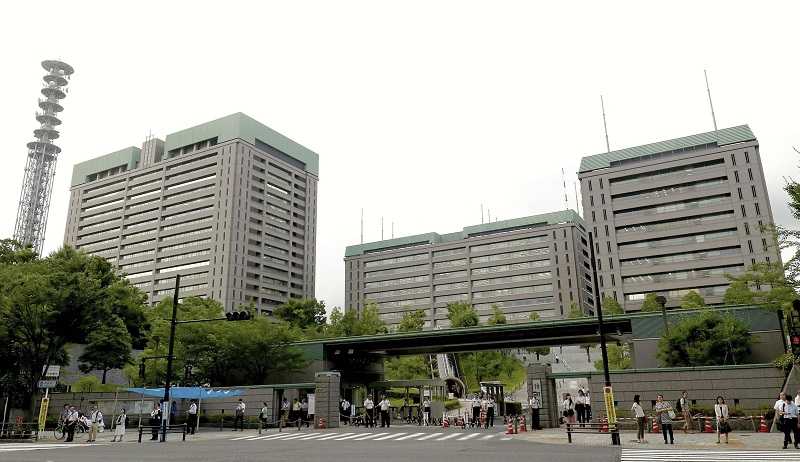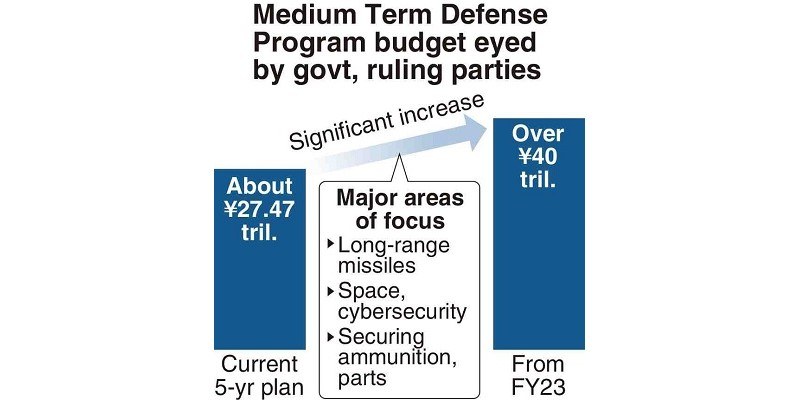
Defense Ministry buildings in Chiyoda Ward, Tokyo
15:49 JST, November 27, 2022
Defense spending is planned to be set at more than ¥40 trillion in the next five-year defense program from fiscal 2023, according to sources.
The government and the ruling parties are coordinating on the Medium Term Defense Program.
At the end of the five-year term in fiscal 2027, the aim is to have this defense spending, plus related expenditures such as research and development on security, reach at least 2% of the nation’s gross domestic product. Though Japan is not a member of the North Atlantic Treaty Organization, this figure would put the nation on par with the NATO guidelines for its members.

The defense program specifies equipment and the total expenditures for the Self-Defense Forces during a five-year period. The current program will be revised by the end of the year together with the National Security Strategy and the National Defense Program Guidelines.
The current Medium Term Defense Program set total defense spending at about ¥27.47 trillion. The government and the ruling parties intend to boost the figure significantly in order to drastically strengthen the nation’s defense capabilities.
Spending listed in the defense program does not include such defense-related costs as expenses for R&D by government entities other than the Defense Ministry and the development of infrastructure. The government plans to establish a framework for allocating such security-related budgets and the Japan Coast Guard budget together as overall defense spending, with the aim of boosting this spending to account for at least 2% of GDP in fiscal 2027.
The nation’s initial defense budget for fiscal 2022 is 0.96% of GDP. With the current size of Japan’s economy, 2% would be about ¥11 trillion a year.
The Defense Ministry has proposed that the next program call for about ¥48 trillion in defense spending, while the Finance Ministry responded that about ¥35 trillion was considered reasonable. Defense Minister Yasukazu Hamada and Finance Minister Shunichi Suzuki are continuing to negotiate.
“It’s not acceptable to be below ¥40 trillion,” a former defense minister said.
The Finance Ministry has called for cutting the defense budget, saying many items are questionable in terms of their cost-effectiveness. The ministry appears to have no choice, however, but to accept an increase in the budget amid a political showdown.
Some LDP members, mainly those who have influence over security policy and defense budgets, have called for defense spending above the mid-¥40 trillion level. The government and ruling parties hope to decide on a basic framework to set the amount by early December, according to the government and ruling coalition sources.
In light of this, the government has found it necessary to set defense spending at more than ¥40 trillion, partly to demonstrate both at home and abroad its determination to drastically strengthen the nation’s defense capabilities.
Japan’s defense budget was about ¥5.4 trillion for fiscal 2022, and is expected to top ¥6 trillion for the next fiscal year. The government intends to boost the amount every year through fiscal 2027.
Initially, the Defense Ministry had allocated ¥5 trillion to fund costs such as the purchase of standoff missiles, which can be a powerful means of employing Japan’s counterstrike capability for self-defense to destroy enemy missile launch sites and other targets. Other major defense budget items included ¥2 trillion for security in space and ¥3 trillion for cybersecurity.
Top Articles in Politics
-

Japan PM Takaichi’s Cabinet Resigns en Masse
-

Sanae Takaichi Elected Prime Minister of Japan; Keeps All Cabinet Appointees from Previous Term
-

Japan’s Govt to Submit Road Map for Growth Strategy in March, PM Takaichi to Announce in Upcoming Policy Speech
-

LDP Wins Historic Landslide Victory
-

LDP Wins Landslide Victory, Secures Single-party Majority; Ruling Coalition with JIP Poised to Secure Over 300 seats (UPDATE 1)
JN ACCESS RANKING
-

Japan PM Takaichi’s Cabinet Resigns en Masse
-

Japan Institute to Use Domestic Commercial Optical Lattice Clock to Set Japan Standard Time
-

Israeli Ambassador to Japan Speaks about Japan’s Role in the Reconstruction of Gaza
-

Man Infected with Measles Reportedly Dined at Restaurant in Tokyo Station
-

Videos Plagiarized, Reposted with False Subtitles Claiming ‘Ryukyu Belongs to China’; Anti-China False Information Also Posted in Japan





















